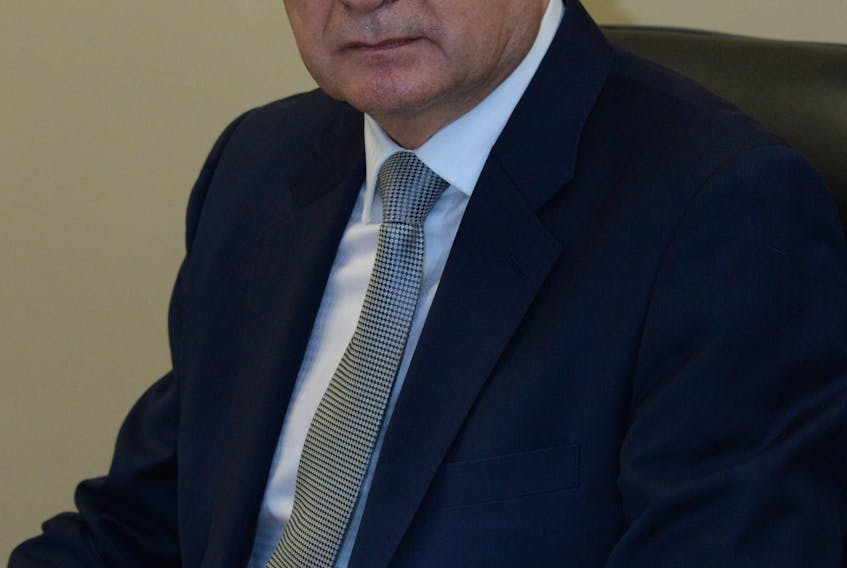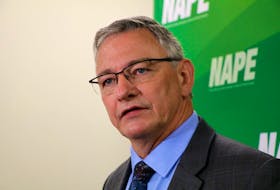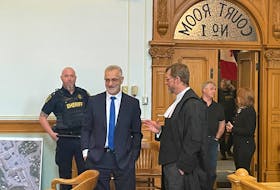ST. JOHN'S, N.L. — The province elected a new, Liberal government at the end of 2015, and then came a new board and CEO at Nalcor Energy. In the spring of 2016, with the Muskrat Falls Project over budget and behind schedule, and its main contractor struggling financially, the project management team was on edge, project director Paul Harrington says.
They felt a deep uncertainty, when looking ahead.
“We were all expecting to be shown the door, to be honest, at that point in time,” he said.
Harrington was called to testify Wednesday at the Muskrat Falls Inquiry.

More than once during in his testimony, he suggested both he and other members of the project management team have been blamed unfairly for problems on the project — for things outside of their responsibility and control.
He said he did not determine the project schedule, for example. He didn’t dispute the project had an “aggressive schedule,” although he disagreed with descriptions given at the inquiry of the likelihood of meeting the original schedule.
“I think the aggressive schedule was clearly something that was a target,” he said. “I don’t set targets. Targets are given to me.”
The same would go for the budget.
“That’s given to me and I have to work within the approved AFE (‘approved for expenditure’ budget) and target that was provided to me. That’s my job and that’s what I try and get the team to get behind, and do the very best they can to deliver against the approved schedule and the approved budget,” he said.
Inquiry co-counsel Irene Muzychka asked about internal management team estimates, and whether or not Harrington and others would respond to the targets set. Did they advise against them? Did they have a dialogue with Nalcor Energy’s leadership, including former CEO Ed Martin and current CEO Stan Marshall?
There’s evidence before the inquiry they did comment. “Management outlooks” included in emails and presentations on the project hit much higher estimated costs much sooner than the approved budgets as time went on. Harrington said it was a reflection of the project team’s belief of where things were going, and accepting the leadership and board of directors might not agree with all the costs, or use their assessment.
“The project team don’t set policy,” he also said. He described changes to the project, such as changes for reliability on the Labrador-Island Link, that had nothing to do with the project team’s management.
Harrington was asked about the idea of his crafting the public messaging on the project, including through revisions of third-party reports.
“I’m providing feedback and comments. That’s what I’m asked to do and that’s what I do. They can take my comments or leave my comments. I don’t care,” he said.
He was referred to examples where he commented and changes were subsequently made before reports were finalized.
"I’m providing feedback and comments. That’s what I’m asked to do and that’s what I do. They can take my comments or leave my comments. I don’t care." — Paul Harrington
“In our industry, when we receive draft documents, we comment on them,” he said, saying it’s then left up to the report’s author.
“If they reject those comments, that’s where it stops,” he said.
Harrington said it’s a common practice that hasn’t changed. EY, the independent engineer, the oversight committee and others continuing to seek comments from Nalcor before reports are completed.
Harrington said the project management team has also been blamed for unforeseeable events, for “black swans” that he feels the Muskrat Falls project has had more than its fair share of.
“There were things going on that we didn’t know would result in Astaldi not being able to come to the table to deliver their contractual commitment,” he said, while being pressed on the handling of Astaldi Canada in 2014 and 2015.
Harrington testified assessing Astaldi’s financial strength going in was not his responsibility, but the responsibility of Nalcor Energy’s corporate finance team.
The project director was scheduled to testify over two days. Harrington will be subject to cross-examination on Thursday.
SNC-Lavalin and project risk
On the subject of SNC-Lavalin’s 2013 risk report, project director Paul Harrington said — as far as he knows — no one on the project team saw the report. He didn’t review it by choice.
As reported, Harrington felt at the time the SNC-Lavalin report was based on the same source data Westney Consulting (tapped by the project team for risk review) had available and costed out risks without considering any of management’s mitigation efforts. He stated in emails it did not use a probabilistic analysis and so offered “misleading” results, and it also didn’t provide an opportunity for the Nalcor team to challenge any underlying assumptions.
But at the Muskrat Falls Inquiry, Harrington also made comments matching what the inquiry has heard from fellow project management team member Lance Clarke. Like Clarke, Harrington said he believed SNC-Lavalin was undermining the project management team. He said he believed the consultant wanted to be awarded a greater amount of work on the project, and was trying to use the report for leverage.
Harrington also said he believed the unearthing of SNC-Lavalin’s report in 2017, when it was ultimately made public, was a further attempt to “snatch the project back” from the project team.
Following criticisms in 2017, he said, he sought a review from Westney Consulting, to check the project team’s risk review and follow through against what SNC-Lavalin had identified when it came to risks that could cost the project. Harrington said it was to satisfy himself, but was also shared with Nalcor Energy’s leadership. He didn’t have any plans to ask that the report from that post-mortem review be made public.
RELATED









